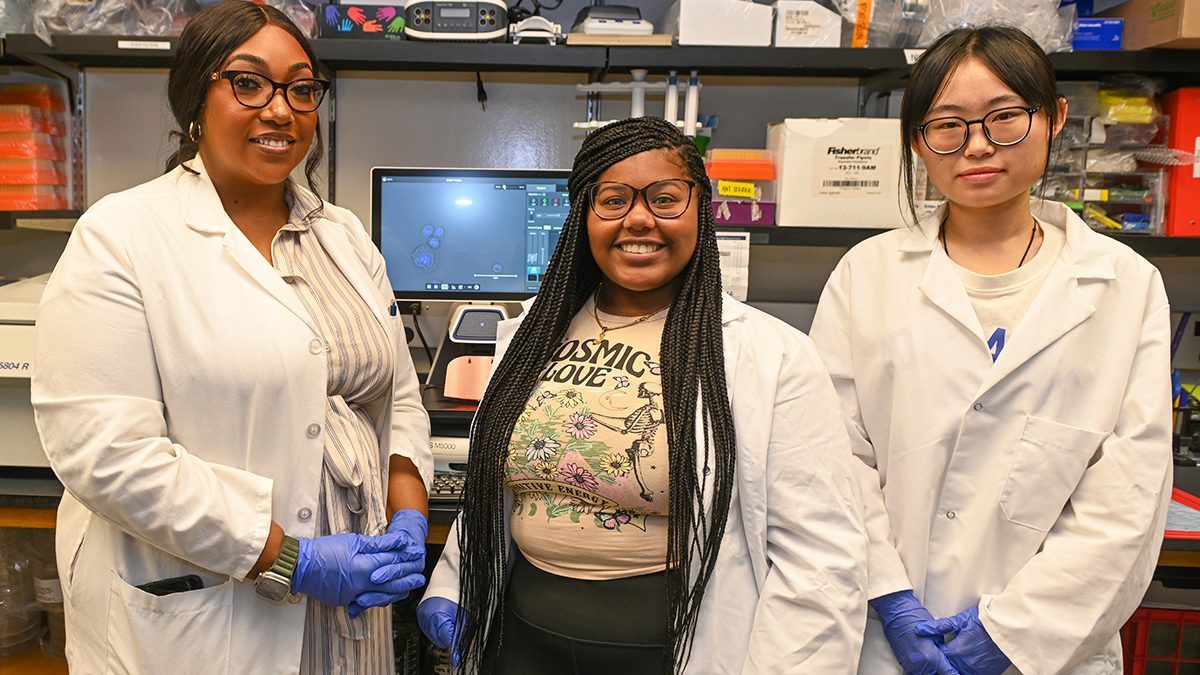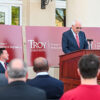|
Getting your Trinity Audio player ready...
|
Troy University biomedical researcher Dr. Jacqueline Jones was recently awarded a $95,000 grant from the Elsa U. Pardee Foundation to conduct research on the factors that drive advanced stages of prostate cancer with the goal of finding a cure. Last week, she and her team saw the successful reduction of a protein in the cancer cells for the first time.
Using human cells, Jones aims to identify ways researchers can understand the molecular cues that help drive cancer. Officially named FoxI3 Regulation of Prostate Cancer Metastasis within the Tumor Microenvironment, her research involves using cloning and gene knockouts—a widely-used genetic engineering technique that involves the targeted removal or inactivation of a specific gene within an organism’s genome.
“What we’re trying to do is identify the factors that contribute to whether a patient gets an advanced stage of prostate cancer and how we can help mitigate that from happening,” she explained. “We want to understand what factors help drive prostate cancer to the bone.”
Jones and her small team of undergraduate and graduate students at TROY, in collaboration with her colleagues at the University of Michigan and Johns Hopkins University, have identified a gene they believe contributes to the “aggressiveness” of prostate cancer.
“Genetically-engineered human prostate cancer cells that are deficient in FOXI3 will be used to conduct additional experiments and tests to determine if the cancer reverts back to a more normal-like state,” she said. “We’ll conduct a series of experiments and in-vivo studies where we’ll put these genetically modified cells back into mice and see if they’re able to grow tumors. If no tumors grow, we’ll have been successful.”
Progress was made already last Wednesday, July 19 with the successful reduction of the protein she and the team previously identified. Next, the samples will be sent to an animal research facility at Tuskegee University.
“Our protein of interest was very low, which means our knockout worked,” she said. “This is great. Genetically engineered clones take months, up to a year. We’ve been growing about 700 different clones, so when you get results it’s very exciting. This is our first time seeing this.”
TROY’s lab boasts a real-time PCR machine that is used around the world to evaluate gene expression along with a microscope capable of immunofluorescence, a way to cause cells to fluoresce different colors like green so that various proteins in cancerous cells can be tracked.
“The fact that we were able to get this grant funding, considering all the other schools that have received this type of funding, strongly suggests that we’re capable of doing research conducted at R-2 and even R-1 research institutions,” Jones said. “That speaks volumes to our ability to do research here and to create novel ideas that are funded by our peers, not just locally but our peers internationally. I think it speaks volumes as to our potential moving forward at Troy University and the need for more biomedically-focused scientists.”
Jones earned her Ph.D. in 2012 from Tuskegee University with a collaborative training program in pathology at the University of Alabama at Birmingham. She also earned her Master of Business Administration from TROY in 2012. She completed her Postdoctoral Fellowship in 2014 at the University of Michigan.
In addition to her research, Jones is an associate professor in the College of Arts and Sciences, teaching genetics and molecular biology with the accompanying labs and clinical biochemistry. She also serves as Associate Department Chair for the Biology Department and as Director of the Biomedical Science Graduate Program. She also works on the LSAMP grant with Dr. Govin Menon. Jones has been on staff at TROY since 2015.
The Elsa U. Pardee Foundation was established in 1944 according to the terms of a will of Elsa U. Pardee who died of cancer in Oct. 1944. Pardee provided a $1 million trust fund for the “promotion of the control and cure of cancer.” Since 1944, the Foundation has given approximately $110.5 million to over 300 different institutions across the United States.



















































